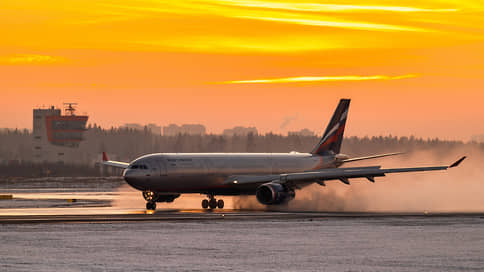Aeroflot wants to return to 2021 traffic levels in a year
[ad_1]

Aeroflot Group expects to transport at least 47 million people by the end of 2024, which is 2.6% higher than in 2021 and 22.5% lower than in 2019. This year, according to Aeroflot head Sergei Aleksandrovsky, the plan is 45 million passengers. Kommersant’s interlocutors at other airlines are more restrained in their forecasts, but in general they also count on the continuation of recovery trends. Experts believe that the potential of international destinations has been exhausted, and the growth of domestic flights, which account for 80% of passenger traffic, will depend on the availability of tickets.
Aeroflot Group’s plan for passenger traffic by the end of 2024 is at least 47 million people, the head of the group, Sergei Aleksandrovsky, told reporters during the EEF. This is 2.6% higher than in 2021, when the group’s airlines carried 45.8 million passengers, and 22.5% lower than the pre-pandemic level in 2019 (60.7 million). In 2022, the Aeroflot group transported 40.7 million passengers, and plans for 45 million this year (an increase of 10.5%). As reported by the Federal Air Transport Agency on September 7, in January-August, Russian airlines increased transportation by 12%, to 70.8 million passengers. Thus, Aeroflot’s forecasts for this year coincide with industry-wide dynamics.
Vitaly Savelyevhead of the Ministry of Transport, September 12:
“Let’s finish this year within 100 million passengers… if we succeed, we will proceed from that.”
S7 told Kommersant that they do not expect their passenger traffic to grow this year, “it will remain approximately at last year’s level.” Kommersant’s interlocutor in another large company noted that he “shares the optimistic mood of the national carrier for the year ahead,” but the forecasts are based on “the minimum task of maintaining current traffic.”
Smartavia said that they plan to transport slightly less than 4 million passengers, which is higher than the level of the previous two years. According to the carrier’s “cautious forecasts” for 2024, passenger traffic may remain at the current year’s level. The “unpredictability of the general situation” can slow down the dynamics. Azur Air plans to carry 2.1 million passengers, which is approximately the same as in 2022. It is premature to talk about the results of 2024, they added, “but our seat load is already one of the highest in the industry, about 97%.”
As Sergey Aleksandrovsky noted, the expected ratio of international (international) and domestic (domestic) transportation of the group in 2023 and 2024 will be 20% and 80%, respectively. This proportion in the aviation industry has been maintained since the “post-Covid” year of 2021. Before the loss of a significant part of foreign destinations in pre-crisis 2019, the group’s foreign flights accounted for almost 45% of passengers (27 million people), including 19.2 million people on Aeroflot itself.
In 2022, Russian airlines transported 95 million people, which is comparable to the levels of 2014–2015. But then the share of the international segment was 45–50%.
Currently, the director of the ACRA corporate ratings group, Alexander Gushchin, does not see any prerequisites for an increase in the number of foreign passengers. Against the backdrop of the situation with exchange rates and the rise in costs of foreign travel, another Kommersant interlocutor in the expert community does not expect a significant change in the structure of air transportation. Today, the Russian Federation has direct connections with 37 countries, while Russian airlines, according to the Federal Air Transport Agency, fly to 24 of them.
A similar ratio of air transportation within the country is observed in China, a Kommersant source notes. But given the smaller size of the Russian market, the economy of airlines until 2022 was based on the opportunity to make money on international transportation, “often subsidizing some domestic flights at their expense.” Now, in order to ensure overall margins without large-scale subsidies for the airline industry, he believes, “tariffs on the domestic market will inevitably increase.” A potential deterrent could be a drop in purchasing power, he concludes. Sergei Aleksandrovsky noted at the VEF that the increase in prices for Aeroflot tickets is expected to be at the level of inflation, provided there is no “extreme increase in other costs – kerosene, airport costs, leasing rates and others.”
The Ministry of Transport expects passenger traffic to reach 101 million people this year. ACRA previously expected 85–95 million passengers in the business-as-usual scenario, subject to subsidizing the industry in the amount of up to 100 billion rubles, although in fact airlines will receive about 57 billion rubles. According to Mr. Gushchin, the best dynamics were possible due to a combination of factors: “We see the preservation of passenger purchasing power, reorientation towards the domestic route network and adaptation to the turbulence of 2022 by carriers that have managed to roll out new routes.” For now, he states, it is difficult to say whether this trend will continue in 2024.
[ad_2]
Source link





